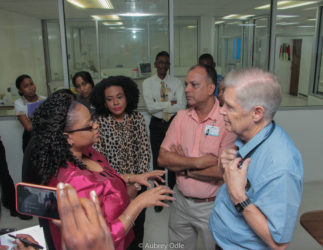Plans are afoot to model services offered by other departments of the George-town Public Hospital (GPH) after those being offered by the recently redeveloped Cardiac Inten-sive Care Unit (CICU), according to Minister of Public Health Volda Lawrence.
Lawrence spoke of the need to adopt a blueprint for other types of services the hospital offers the public during a recent tour of the CICU.
Present during the tour were Kesaundra Alves, Chairperson of the GPH Board; Dr Sheik Amir, Director of Medical and Professional Services; Allan Johnson, GPH Chief Executive Officer (CEO) and Emeritus Professor of Cardiac Sciences and Medicine, University of Calgary, Alberta, Canada, Dr J. Wayne Warnica.
According to a statement issued on Monday by the ministry, Lawrence observed the progress of the CICU, which is housed at the top floor of the city referral institution.

“I am extremely happy by the accommodation made by the hospital administration to ensure that this particular unit can be established and at high efficiency levels. I believe we can use this as a role model for other aspects of health care at the GPHC,” Lawrence said.
“These are some of the things that we note that are low hanging fruits that can be addressed. For example, the shortage of the personnel, especially since they are being trained,” she added.
Notwithstanding, the minister further disclosed that the ministry will be working closely with a committee to ensure that the establishment of the Dr Yesu Persaud Medical Centre gets on stream at the earliest date.
“We believe that such a facility will enable the hospital and its staff and also the university students to benefit more from what’s been done here. I am happy that we can provide the services where person can come here and get the attention and go back to their family,” she remarked.
According to the statement, the minister emphasised the importance of the care patients receive after discharge from hospitals across the country and reminded that that Com-munity Health Workers (CHWs) have a very important role to play at the primary health care facilities since “aftercare” is of vital importance to every patient.
“We have to ensure that when persons return to their community, they don’t go back to the traditional medicine but continue to access the kind of care they need. Many times we as a people are not cognisant of how important step by step (the) process is,” she said.
Meanwhile, Warnica said ever since the establishment of the CICU patients have been privileged to specialised treatment and care.
“We put through more than 50 patients a month and most of them are very sick,” he said.
Additionally, Warnica noted that since the Guyana Programme to Advance Cardiac Care (GPACC) became fully operational in June, 2016, he and his team have managed and treated thousands of patients suffering from cardiovascular diseases, with the youngest patient being 14-years-old.
Part of the GPACC, in partnership with the Libin Cardiovascular Insti-tute and Global Health and International Partnerships/ University of Calgary, the ministry and the GPH, the CICU has been redeveloped into a fully functioning unit with 13 beds, a significant increase from its initial capacity of 4 beds.
Meanwhile, the GPACC was developed and implemented under the directions of Warnica and Debra Isaac, who is the Clinical Professor of Medicine and Cardiology, in partnership with Dr Mahendra Carpen, Head of Cardiology and Resident Cardiologist attached to the Caribbean Heart Institute.





